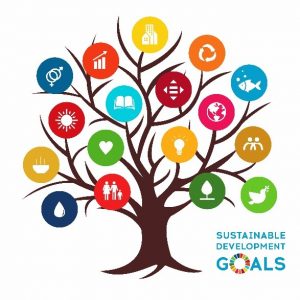 Sustainability requires the collaborative effort of everyone, including academic institutes. At BCIT, sustainability means innovating to support the social and economic prosperity of the Province without harming our natural environment or as defined in the Sustainability Vision, “enabling people to lead socially just lives within ecological limits”. In furthering the Institute’s global leadership in the advancement of sustainable cities, BCIT became a signatory to the Sustainable Development Goals (SDG) Accord in 2022. Since then, BCIT Institute Sustainability has been assessing the Institute’s contribution towards the SDGs and is now excited to launch UN Sustainable Development Goals (SDG) at BCIT webpages that outlines how BCIT staff, faculty, researchers, and students are making a global impact.
Sustainability requires the collaborative effort of everyone, including academic institutes. At BCIT, sustainability means innovating to support the social and economic prosperity of the Province without harming our natural environment or as defined in the Sustainability Vision, “enabling people to lead socially just lives within ecological limits”. In furthering the Institute’s global leadership in the advancement of sustainable cities, BCIT became a signatory to the Sustainable Development Goals (SDG) Accord in 2022. Since then, BCIT Institute Sustainability has been assessing the Institute’s contribution towards the SDGs and is now excited to launch UN Sustainable Development Goals (SDG) at BCIT webpages that outlines how BCIT staff, faculty, researchers, and students are making a global impact.
The SDG accord includes the 17 goals set forth by the United Nations (UN) as a universal call to protect the planet, end poverty, and improve the lives and prospects of all humans. The SDGs at BCIT webpages feature inspirational stories about how BCIT is working toward peace and prosperity for people and the planet, now and into the future. Highlights include information about courses, programs, applied research, innovation, operational initiatives, and other ways the BCIT community is contributing to each of the SDGs.
The launch of the SDGs at BCIT webpages coincide with SDG Week Canada, which takes place from March 6-10, 2023. This is a national collaboration from Colleges and Institutes Canada (CICan), Sustainable Development Solutions Network (SDSN) Canada, and the Sustainability Hub at UBC. SDG Week includes workshops, panels, and other interactive programming to increase awareness of and engagement with the 17 Sustainable Development Goals on university and college campuses across the country.
“Academic institutes, like BCIT, have a major role in advancing the SDGs,” explains Christina Olsen, Acting Director, Institute Sustainability, BCIT. “They help shape future leaders, integrate social and environmental values into curriculum, support impact-driven research, facilitate collaborative and inclusive partnerships with industry and other stakeholders, and spearhead environmentally sound operations.”
Have you subscribed? Sign-up to receive the latest news on BCIT.
Christina adds, “BCIT can be proud of how we deliver on the SDGs, especially by sending problem solvers instead of problem makers out into the world. Framing our work within the SDGs is also a great way to communicate what we do to industry and government collaborators everywhere who are increasingly using this framework.”
BCIT will be submitting its first SDG Accord report this year, using the Sustainability Tracking, Assessment & Rating System (STARS) framework to help measure and report on contributions towards the SDGs.
Learn more about how the BCIT community is making a global impact through its contributions towards the UN Sustainable Development Goals.
